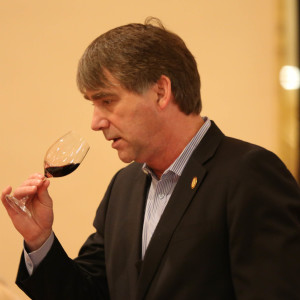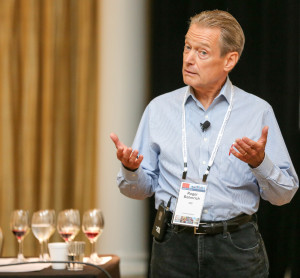SWE’s 40th Annual Conference included some serious, advanced tasting classes led by some of the most renowned wine experts in the world. Tim Gaiser, MS presented on “Cause and Effect and Objective Factors,” and Roger Bohmrich, MW presented “Minerality: Examining, Challenging, & Tasting its Meaning.” Both were among the high-rated session at the conference.
Advanced Tasting Strategies: Cause and Effect and Objective Factors—presented by Tim Gaiser, MS. The first part of Tim’s session covered the “why” questions in the context of deductive tasting. In other words, what is it about this wine that makes it look, smell, and taste the way it does? This consideration can be very useful for a taster in learning about classic grapes/wine styles in tasting practice, and also exercises the critical thinking used in deductive tasting. Some examples of cause and effect include: primary colors (which are a result of grape variety, time spent in barrel, and/or oxidation); intensity of aroma (which may result from grape variety, climate, ripeness levels, structural elements such as high alcohol, malo-lactic fermentation, and/or oak usage); and body (which may result from alcohol or glycerin level and/or the level of dry extract in a wine). More information on cause and effect may be found on Tim’s blog post titled “Cause and Effect: The Why behind Deductive Tasting.”
Another topic covered in Tim’s presentation was the importance of trying to identify those factors in a wine that are measurable, or objective. Examples of objective factors include basic measurements such as the acid, alcohol, and tannin levels; and may also include aromatic terpenes, pyrazines or thiols; evidence of oak or signs of oxidation. For more information on objective factors, see Tim’s blog post titled “Tasting Strategies.”
Minerality: Examining, Challenging, & Tasting its Meaning-presented by Roger Bohmrich, MS: Roger started his session with the very interesting fact that the term “minerality” has only recently been widely used as a descriptor for wine. As a matter of fact, the term is not included in Ann Noble’s Wine Aroma Wheel, was not mentioned in Emile Peynaud’s book The Taste of Wine, and did not appear in the Oxford Companion to Wine until the current (2015) edition.
The session went on to confirm the wide-spread belief that mineral-like aromas are not believed to be derived directly from minerals in the soil, and that soil minerals are not the same substance and mineral nutrients.
Along the way, however, the point of view of many “mineral believers” was also discussed, and some of the wines that these “believers” point to as examples were tasted. These included Domaine Patrick Baudouin Anjou “Effusion” 2014, Fritsch Grüner Veltliner “Steinberg” 2015, and Christian Moreau Père & Fils Chablis 2014, among others. Attendees were encourage to rate the wines based on their own perception on minerality—or not—in the glass. The last wine tasted, a Luigi Bosca Mendoza Malbec from 2013, was chosen specifically because it was unlikely to show minerality; a perception with which the great majority of the audience agreed.
In the end, it was concluded that there are two competing hypotheses of minerality in wine: one that holds the view that minerality in wine is a direct expression of minerals in the wine, and one that defines minerality as a complex sensory phenomenon with many causes and expressions. As a result of Roger’s extensive research, he has summarized that the factors that can lead to a mineral perception in wine may include high total acidity, presence of succinic acid, absence of “fruitiness,” presence of volatile thiols, trace elements and salts, as well as culture, psychology, and expectation. For more information, you may download the slide show here: Minerality-Examining, Challenging, and Tasting its Meaning-presented by Rober Bohmrich, MW
We will be posting additional conference recaps in the next few days. In addition, we are building our permanent archive of notes from the 2016 SWE Conference-click here! If you are a conference speaker who would like to share your materials, please contact Jane A. Nickles at jnickles@societyofwineeducators.org

